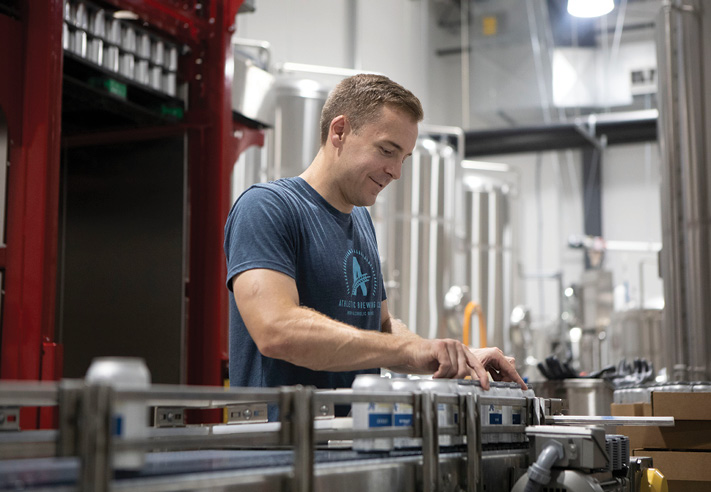Fairfield County”™s restaurants and bars are hoping to hang on in the wake of Gov. Ned Lamont”™s order for them to close until further notice.
Restaurants can offer takeout service, drive-thrus, curbside service and delivery, but no in-house dining.
Lamont joined New York Gov. Andrew Cuomo and New Jersey Gov. Phil Murphy on March 16 to announce the move, which also closed movie theaters, fitness centers, casinos and racetracks. Tribal-owned casinos are exempt from the order, but Foxwoods and Mohegan Sun ultimately agreed to temporarily close from 8 p.m. on March 17 for a two-week period. Neither Foxwoods or Mohegan Sun have closed since opening in 1992 and 1996, respectively.

The governors also banned gatherings of more than 50 people, the enforcement of which Ryan Broderick, co-owner of Reverie Brewing Co. in Newtown, had wondered about before the mandatory closure announcement.
“We have people coming in here in groups of two or three or more. We have birthday parties,” he said. “How are we supposed to monitor that?”
That point is now moot.
The brewery sells snacks from Newtown”™s B.D. Provisions and Shelton”™s Drunk Alpaca, although the latter closed on March 16 until further notice.
“Closing the brewery to customers will be hard on us since all our restaurant business where we sell kegs to businesses will stop as well,” said Mark Szamatulski, co-owner of Veracious Brewing Co. in Monroe, “so we will lose our wholesale business and our retail business, meaning zero income with bills to pay.
“If we can still sell some takeout, it will help us a little, but with no money coming in it will be hard to pay rent, insurance, payroll and for goods we bought in the last 30 days.”
Szamatulski said a lack of clarity from the state Department of Consumer Protection (DCP) on whether he could or could not sell beer to go meant that he would err on the side of caution.
According to Executive Order No. 7D, signed by Lamont on March 16:
“Effective at 8 p.m. on March 16, 2020, and through April 30, 2020, unless earlier modified, extended or terminated by me, any restaurant or eating establishment and any location licensed for on-premise consumption of alcoholic liquor in the State of Connecticut, except for Class III and Class II Tribal Gaming enterprises, shall only serve food or nonalcoholic beverages for off-premises consumption.”
A call to the DCP for clarity was not returned, but other brewers said they are moving forward with “grab and go” initiatives.
“We”™ve always sold cans and growlers,” said Scott Vallely, owner and brewmaster at Danbury”™s Charter Oak Brewing Co. “Now that the taproom is closed, we”™re just doing that, letting one person in at a time.”
Vallely said that customers can also call ahead to place an order, then call again when they arrive, whereupon a staffer will bring the beer out and put it in their car.
“It”™s never going to be a big moneymaker for us,” he admitted. “It”™s not like there”™s a long line of cars in our parking lot. But our message is to keep buying from us or from their retailer ”” support Charter Oak and support your local retail guy.”
Broderick announced on March 17 that those with Reverie growlers will receive new ones at no cost. It will take phone orders for curbside delivery.
“We”™re also upping our distribution (of cans) to some of the package stores we have relationships with,” Broderick noted.
Nod Hill in Ridgefield has an app that allows consumers to make purchases on the spot ”” and said it will continue to have food trucks on its premises until further notice.
At Athletic Brewing Co., Stratford”™s nonalcoholic beermaker, co-founder Bill Shufelt said 70% of its 50-person workforce is working from home, with the remainder working staggered shifts.
“On the package side, our team still feels it”™s safe to come to work,” he said.
RESTAURANTS HUNKER DOWN
The state”™s 8,500-plus restaurants, which according to the Connecticut Restaurant Association (CRA) employ more than 160,000 people, equal to about 10% of the state”™s workforce, are also facing the new reality, limited as they are to curbside, drive-thru and delivery service.
Before Lamont”™s ban on in-house dining went into effect, CRA Executive Director Scott Dolch wrote to the governor, Department of Economic and Community Development Commissioner David Lehman and legislative leaders asking for a number of economic relief measures, including a 90-day extension on paying monthly sales taxes, eliminating penalties for late payment of business and property taxes and the like.
“We cannot overstate how many restaurants are already facing dire circumstances,” Dolch wrote. “Anecdotally, one of our members has already seen 47 scheduled parties cancel through the month of April, and another has already seen a reduction in sales of 45%. Our restaurants want to stay open and keep employees on the payroll. However, without state action many restaurants will have no choice but to suspend operations, and potentially turn what we hope is a short-term public health emergency into a much longer economic crisis for Connecticut.”
Two days later, however, the mandate to close went into effect.
“The CRA team continues to explore federal, state and local relief and economic stimulus options for our restaurants,” Dolch said afterwards.
On March 17, Lamont announced that small businesses and nonprofit organizations in the state that have been negatively impacted by the coronavirus outbreak are eligible for disaster relief loans of up to $2 million from the U.S. Small Business Administration.
But Vallely at Charter Oak wondered how much paperwork ”” and time ”” would be involved with securing such a loan.
“We”™re all taking on debt,” he said. “And what they”™re offering is not a gift. It”™s not a grant. It”™s a loan. But there”™s a lack of revenue now, so you have got to do things you normally wouldn”™t do.”
“If the government can shut us down, they should also offer some real economic assistance, not just assistance to airlines and large businesses,” Szamatulski at Veracious said.


















